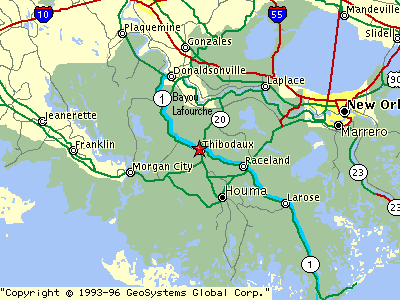

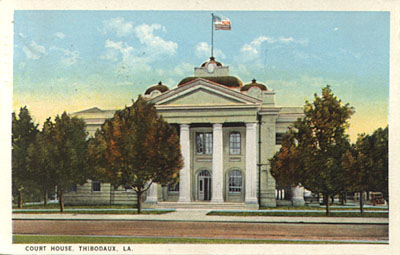 1924 Post Card
Bayou Lafourche, which wends its
way 100 miles from the Mississippi River to the Gulf of Mexico,
was first home to the Chitimacha Indians. Its original name was Lafourche
des Chetimachas.
In the late 1700s, it became a popular settling place for the Acadians, French nationals who had settled in the Acadia region of Canada before they were expelled by the British. Others came to the region and their cultures, including French, Indian, Spanish, African and Italian, blended to form a unique community along Bayou Lafourche, one that is today known as "The Longest Street in America."
Lafourche Parish,
The headwaters for Bayou Lafourche are in Donaldsonville, which is the parish seat for Ascension Parish. William Donaldson founded Donaldsonville in 1806. It was incorporated in 1820 and served as the state capital in 1830.
The area has produced three governors of Louisiana: Henry Schuyler Thibodeaux, founder of Thibodaux, 1824; Edward Douglas White of Thibodaux, 1835-1839 (father of the chief justice); and Francis T. Nicholls of Thibodaux, 1877-1880 and 1888-1892. Gov. Huey P. Long, (1928-32) was the son-in-law of Sallie Armitage Billiu McConnell, a native of Thibodaux.
In addition, Sallie Armitage Billiu McConnell, a native of Thibodaux, was the mother of U.S. Sen. Rose McConnell Long (1936-1937), mother-in-law of U.S. Sen. Huey P. Long (1932-36) and grandmother of U.S. Sen. Russell Billiu Long (1948-1987). There have been eight members of the U.S. House of Representatives from the area: Edward Douglas White of Thibodaux, 1829-1834 and 1839-1843; Bannon G. Thibodeaux of Thibodaux, 1845-1849; Randall Gibson of Gibson and Thibodaux, 1875-1883; Andrew Price of Thibodaux, 1889-1897; Whitmell P. Martin of Thibodaux, 1915-1929; Numa Montet of Thibodaux, 1929-1937; W.J. "Billy" Tauzin of Chackbay, 1980-2004; and Charles J. Melancon of Napoleonville, 2005- present.
Louisiana Supreme Court Associate Justice John L. Weimer III is a native and resident of Thibodaux. In addition, former Gov. Francis T. Nicholls of Thibodaux served as chief justice of the state Supreme Court from 1892-1904 and as an associate justice from 1904-1911. Edward Douglass White served on the Louisiana Supreme Court from 1879-1880 before his service as a U.S. senator and U.S. Supreme Court justice. Presley K. Ewing, chief justice of the Texas Supreme Court in 1905, was born in Lafourche Parish in 1860.
The Emancipation Proclamation, President Lincoln's edict issued Jan. 1, 1863, that is credited with freeing
slaves, specifically mentions Lafourche, Assumption, Ascension, Terrebonne and St. James,
among other Louisiana parishes, as places where the proclamation did not apply. See page 3 of the original on file with the National Archives.
Silas Grisamore, a native of Indiana, served Lafourche Parish as mayor of Thibodaux, president of the Lafourche Parish Police Jury and School Board, all at the same
time, in the late 1800s. He fought in the Civil War and wrote about his experiences in the now defunct newspaper, the Thibodaux Sentinel. His memories can be found in the book Civil War Reminiscences of Major Silas T. Grisamore, C.S.A.,
edited by Arthur W. Bergeron Jr. and published in 1993.
Dr. Theodore Kenneth Lawless, one of the world's leading skin specialists who pioneered treatments for venerial
disease and Hansen's disease and the use of radium in cancer treatment, was born in Thibodaux on Dec. 6, 1892.
Theodore Ward, an award-winning playwright of the 1940s whose works included
"Our Lan" and "Big White Fog," was born in Thibodaux in 1902. Ward was a contemporary of
Langston Hughes and novelist Ralph Ellison. He worked in the
Works Progress Administration's Federal Theatre Project during the Depression.
He received a Rockefeller-supported National Theater Conference fellowship in 1947. A year later, he won a
Guggenheim Fellowship for drama. Later in life,
Ward was playwright-in-residence at the Free Southern Theater in New Orleans.
He died in 1983. Columbia College in Chicago established an award in his name for outstanding young black playwrights.
Mary King Fulford, Thibodaux's first female post master, was appointed to the post in 1870 by her childhood sweetheart, President Ulysses S. Grant. Mrs. Fulford was an important person in the history of the Presbyterian Church of Thibodaux.
There are some good histories of the area online. Timothy Hebert has written a history of the Methodist Church in the bayou region and the rest of Acadiana.
© 2001 by Eddie "Bush" Bernard |
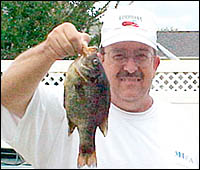
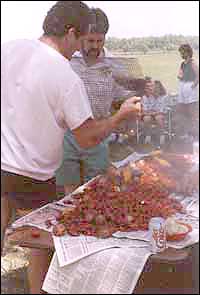 named for the bayou that cuts through it, is the
12th largest parish in the state. It has 89,974 residents, according to the 2000 census. Lafourche was one of the
original 12 counties of Louisiana when it became a U.S. territory.
Assumption Parish, which is named for the church parish founded in Plattenville in 1793, was
carved out of Lafourche in 1807 and they were among the 19 original parishes when
Louisiana became a state in 1812.
named for the bayou that cuts through it, is the
12th largest parish in the state. It has 89,974 residents, according to the 2000 census. Lafourche was one of the
original 12 counties of Louisiana when it became a U.S. territory.
Assumption Parish, which is named for the church parish founded in Plattenville in 1793, was
carved out of Lafourche in 1807 and they were among the 19 original parishes when
Louisiana became a state in 1812.
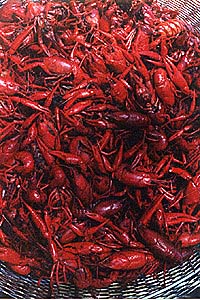 Napoleonville is the parish seat for Assumption Parish. It was incorporated on March 11, 1878.
A solider who served under Napoleon Bonaparte gave the village its name. It is the only incorporated town in
the parish. Other communities along Bayou Lafourche in Assumption Parish include Plattenville, Paincourtville, Belle Rose and Labadieville.
Pierre Part, Bayou L'ourse and Belle River are in the interior of the parish.
Napoleonville is the parish seat for Assumption Parish. It was incorporated on March 11, 1878.
A solider who served under Napoleon Bonaparte gave the village its name. It is the only incorporated town in
the parish. Other communities along Bayou Lafourche in Assumption Parish include Plattenville, Paincourtville, Belle Rose and Labadieville.
Pierre Part, Bayou L'ourse and Belle River are in the interior of the parish. 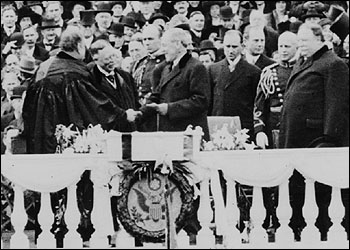 The Bayou Lafourche area has produced a chief justice of the United States Supreme Court:
The Bayou Lafourche area has produced a chief justice of the United States Supreme Court:
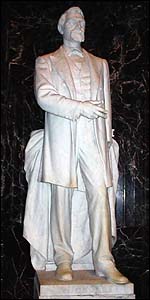 Francis T. Nicholls
Francis T. Nicholls
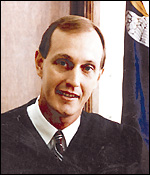 La. Supreme Court
La. Supreme Court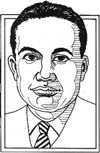 Dr. Theodore
Dr. Theodore